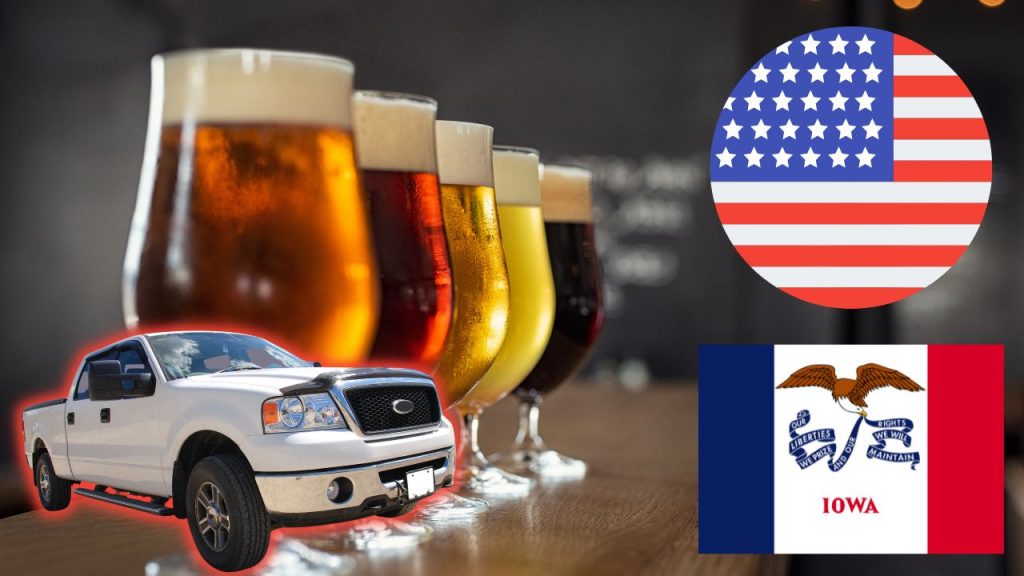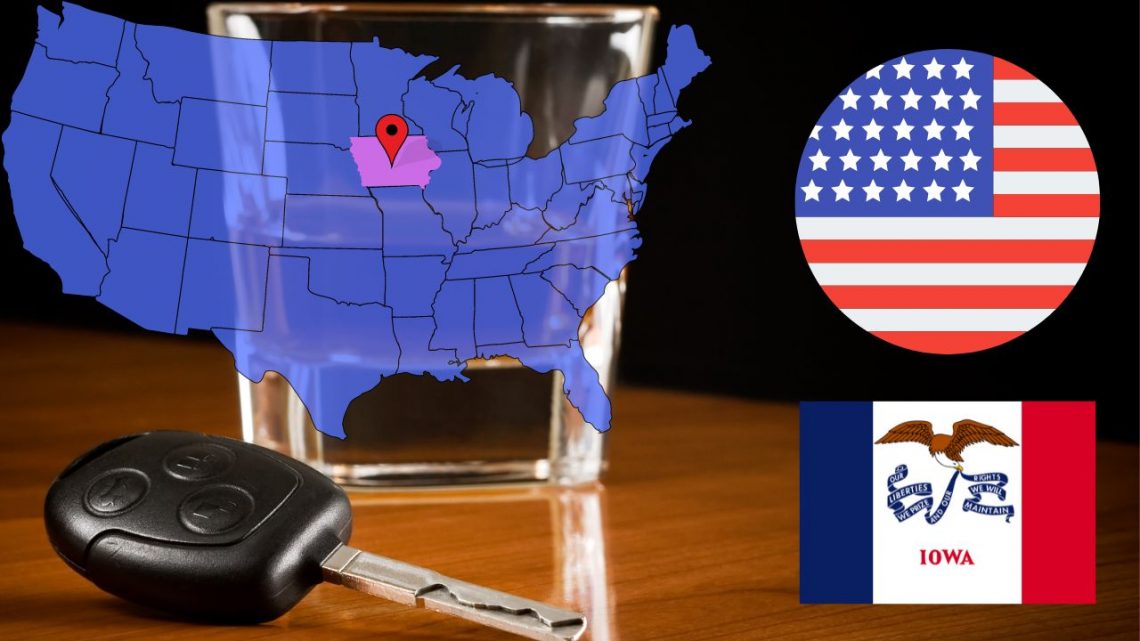In Iowa, the legal maximum blood alcohol content (BAC) is set at 0.08%, equivalent to 80 milligrams of alcohol per 100 milliliters of blood.
Remember that this post aims to inform readers about Iowa’s drunk driving laws. This article is not intended to advertise or promote drunk driving.
What is the legal alcohol limit for driving in Iowa?
In Iowa, the legal alcohol limits for driving vary depending on the driver’s license type and age. These limits are established to enhance road safety and reduce the risks associated with impaired driving. Below are the specific legal blood alcohol content (BAC) limits for each category of drivers:
- Regular Drivers: The BAC limit is set at 0.08%. This applies to the majority of drivers operating personal vehicles.
- Commercial Drivers: For those holding a commercial driver’s license, the BAC limit is reduced to 0.04%, reflecting the higher standards expected due to the nature of their responsibilities.
- Minors (Under 21): Iowa enforces a zero-tolerance policy for underage drivers. It is illegal for minors to drive with any detectable amount of alcohol in their system, aiming to discourage drinking and driving from an early age.
Drink and Drive Penalties and Punishments in Iowa
In Iowa, penalties for driving under the influence (OWI) are designed to both penalize and rehabilitate offenders, reflecting the state’s commitment to reducing impaired driving incidents. The severity of penalties increases with each subsequent OWI offense, underscoring the importance of understanding the legal repercussions of driving while intoxicated. It is crucial for residents and drivers in Iowa to stay informed about these laws, as they are subject to change. We encourage regular consultation of the official state website for the most current information.
Penalties by Offense Number:
- First Offense: Classified as a serious misdemeanor, punishable by up to one year in jail, with a mandatory minimum of 48 hours. Fines are set at $1,250, with potential reductions under certain conditions. Offenders are required to undergo a substance abuse evaluation, complete treatment if necessary, and may face license suspension.
- Second Offense: Considered an aggravated misdemeanor, requiring a mandatory minimum jail time of seven days, which cannot be suspended, and fines ranging from $1,875 to $6,250. The offender’s vehicle may be impounded, and they must undergo substance abuse evaluation and treatment.
- Third and Subsequent Offenses: Classified as a class “D” felony, with a mandatory minimum imprisonment of 30 days and fines between $3,125 and $9,375. License revocation for six years is possible, along with vehicle impoundment and mandatory substance abuse treatment.
- Death or Serious Injury: Cases resulting in unintentional death are treated as class “B” felonies, with up to 25 years in prison and a six-year license revocation. Serious injury cases are class “D” felonies, with penalties including up to five years in prison and fines from $750 to $7,500.
Additional Considerations:
- Substance Abuse Evaluations and Treatment: All convicted OWI offenders must undergo evaluation and follow recommended treatments at their expense, potentially including participation in a drinking drivers course and reality education substance abuse prevention programs.
- Victim Restitution: Offenders are required to make restitution payments to victims for damages directly resulting from the offense. Public agencies involved in emergency responses can also claim restitution.
- License Revocations: Based on the OWI conviction, revocation periods vary, with specific restrictions based on the offender’s BAC level and the circumstances of the offense, including requirements for ignition interlock devices for certain cases.
These penalties serve as a reminder of the serious consequences of driving under the influence in Iowa. The structured approach to punishment and rehabilitation aims to deter repeat offenses and encourage responsible driving behavior. For the most accurate and up-to-date information on OWI laws and penalties in Iowa, please visit the official state website regularly.
How Can I Calculate if My Alcohol Blood Limit is Legal in Iowa?
In Iowa, police determine an individual’s blood alcohol content (BAC) level primarily through breathalyzer tests conducted during traffic stops or sobriety checkpoints. These devices are designed to accurately measure the alcohol concentration in one’s breath, which correlates with the level of alcohol in the blood. The legal BAC limit in Iowa is 0.08% for standard drivers, 0.04% for commercial drivers, and any detectable alcohol for drivers under 21 years of age.
For those concerned about staying within legal limits, there are proactive measures you can take to estimate your BAC level and ensure you’re driving safely and legally. As a former phlebotomist with a decade of experience, I recommend the following methods:
- Use a High-Quality Alcohol Breathalyzer: For personal use, one of the most reliable devices is the BACtrack S80. It offers professional-grade accuracy and is DOT & NHTSA approved, as well as FDA 510(k) cleared. Having this device in your car can be a practical way to assess your BAC level before deciding to drive. It’s particularly useful in Iowa, where individuals may underestimate their level of impairment. The BACtrack S80‘s precision can help prevent instances of driving while over the legal limit.
- Utilize My BAC Calculator: Developed in collaboration with fellow phlebologists and web developers, this online tool is designed to estimate your BAC based on various factors, including the amount of alcohol consumed, the time period over which it was consumed, your weight, and your gender. While it cannot replace professional testing equipment, it can provide a useful estimate of your BAC level, helping you make informed decisions about driving.
It’s important to remember that both of these methods, while useful, cannot guarantee 100% accuracy in measuring your BAC. Factors such as metabolism, food intake, and individual health conditions can affect how your body processes alcohol. Therefore, these tools should be used as guides rather than definitive measures.
By taking advantage of these resources, you can better assess your fitness to drive and avoid the legal and safety risks associated with drunk driving. Always err on the side of caution; if in doubt, choose not to drive.
Ways to Avoid Driving with a High BAC in Iowa

Driving under the influence of alcohol not only risks your own safety but also the safety of others on the road. In Iowa, where the legal Blood Alcohol Content (BAC) limits are strictly enforced, it’s important to plan ahead to ensure you’re not driving while impaired. Here are some practical tips to avoid driving with a high BAC in the state:
- Utilize Ride-Sharing and Taxi Services: Modern technology has made it easier than ever to find a safe ride home. Apps like Uber and Lyft offer convenient, on-demand transportation services at your fingertips. These apps can be especially useful in urban areas of Iowa, such as Des Moines and Cedar Rapids, where service availability is high. Additionally, local taxi companies provide a reliable alternative. In Des Moines, consider using USA Cab, and in Cedar Rapids, American Class Taxi offers reputable services. These options can help you safely reach your destination without taking unnecessary risks.
- Order a Designated Driver Service: If you find yourself in a situation where you’ve driven to a location and then consumed alcohol, leaving your car behind might not be preferable. In such cases, designated driver services offer a solution. These services can send a driver to take you and your car home. In Des Moines, Chauffeurs Of Distinction is a notable provider, and in Cedar Rapids, To The Rescue Transportation offers similar services. Simply searching for “designated driver service” along with your city name in Iowa can help you find local options that will ensure both you and your car get home safely.
Planning ahead and considering these alternatives can greatly reduce the risk of driving with a high BAC. The convenience of ride-sharing apps, local taxi services, and designated driver services makes it easier than ever to make responsible choices after consuming alcohol. Always prioritize safety over convenience; the consequences of driving under the influence are far-reaching and can have a lasting impact on your life and the lives of others.
Sticking to DUI Laws in Iowa: Statistics
In Iowa, driving under the influence of alcohol or drugs is illegal. In 2020, 337 fatal accidents involved intoxicated drivers, with 113 cases featuring drivers over the 0.08% BAC legal limit. Iowa’s strict DUI laws aim to prevent drunk driving. Always ensure you’re below the legal BAC before driving, or opt for a designated driver or taxi service instead.
Remember, the safest choice is not to drive after drinking. Even small amounts of alcohol can impair your driving. If necessary, check your BAC with a reliable breathalyzer and stay informed on Iowa’s DUI regulations by visiting the state’s official website. Driving sober is crucial for your safety and others on the road.







